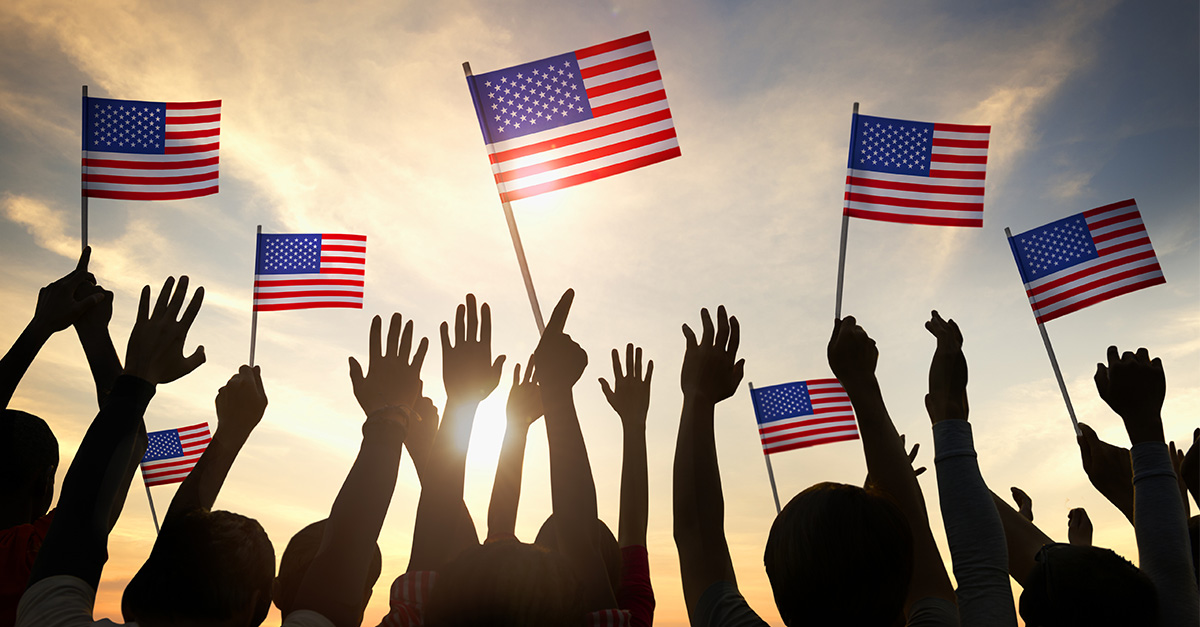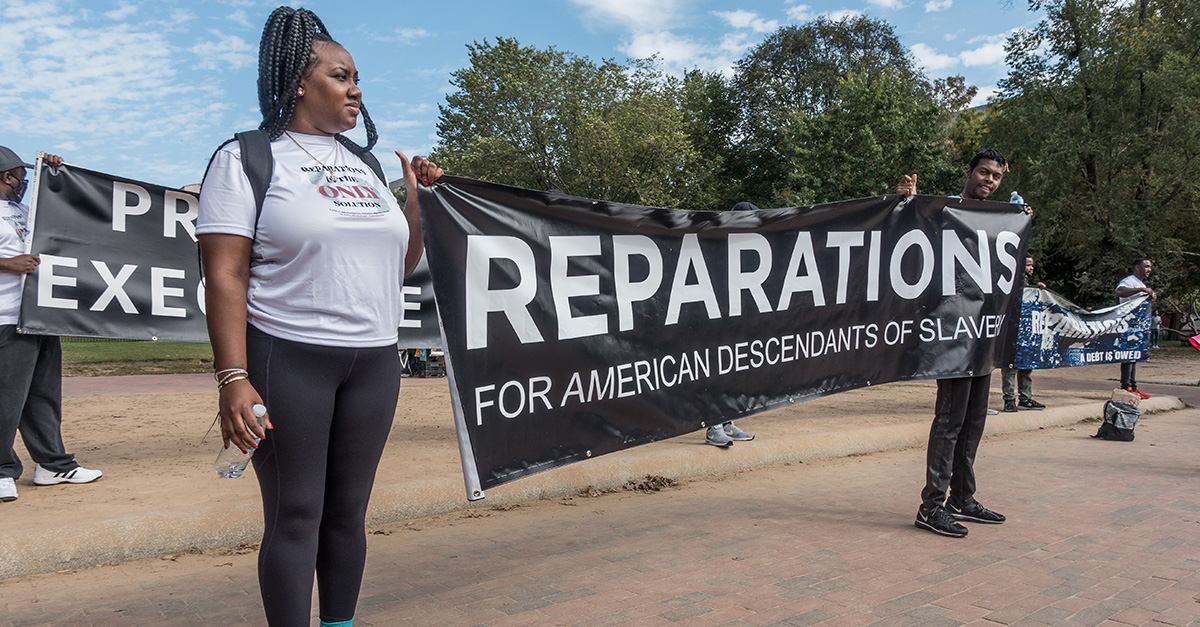


Get a free copy of Parental Rights & Education when you subscribe to our newsletter!

When practiced according to a Christian worldview, patriotism is a beautiful thing, but it should never supersede our first priority — belief in and commitment to Jesus Christ.
Presbyterian pastor William S. Plumer (1802-1880) once said, “Patriotism is a good thing, but patriotism will save neither you nor me.”
His remarks came during the U.S. Civil War and related to his refusal to take sides in the bloody conflict. Plumer remained neutral, abstaining from bringing political matters to the pulpit. He quit his professorship at Pittsburgh Theological Seminary because of opposition to his beliefs. Although he prayed for the nation and for President Abraham Lincoln, he felt it was morally inappropriate to mix politics and Christianity.
Plumer, like many Americans today, had deep connections to the country. His father fought for independence against England, and by all accounts, Plumer was a proud American. But his first priority was serving and glorifying his Lord and Savior, Jesus Christ.
By contrast, as a chaplain in World War I, George W. Truett encouraged patriotism and was a prominent Christian leader in favor of the U.S. entering the war. Similarly, during World War II, Truett preached, “Patriotism not only demands the sacrifice of life when the time comes, it demands the consecration of life, all the time. Every citizen is to live at the highest and best for his country all the time!”
So which view is most biblical? Throughout all conflicts in American history, differing messages from the pulpit have appeared. Some Christians proudly label themselves as isolationists, while others advocate for democracy and freedom as central Christian principles. Billy Graham passionately connected religious liberty and political democracy to the fundamental beliefs of Christianity.
It is human nature to embrace nationalism. Most people across the globe have a sense of pride in and allegiance to their respective nation. Much the same, Christians often proudly assert their ancestral heritage. When examining the Scriptures, this appeared to be the case too. Jews were separate from the Samaritans, as the Greeks were from the Romans.
Of course, Scripture makes it clear that Jesus Christ and the salvation found in Him eliminated the barriers of ancestry and race. For example, Galatians 3:28 says,
“There is neither Jew nor Greek, there is neither slave nor free, there is no male and female, for you are all one in Christ Jesus.”
Jesus Christ provides a freedom that concentrates on the soul, not race or ancestry.
But that doesn’t make patriotism, in and of itself, wrong. Patriotism is nationalism; it is simply a love of one’s country. In the Christian worldview, this is acceptable, but such a position can never supersede a believer’s commitment to Jesus Christ. In Luke 14:27, Jesus made it clear that anyone who wants to be His follower must put Him first, saying: “Whoever does not bear his own cross and come after me cannot be my disciple.” And in Luke 14:26, Jesus explained that one must hate his own life to be His disciple. In short, Jesus taught that becoming His follower required sacrificing one’s wants, desires, and needs.
Further, the two Great Commandments (Matthew 22:36-40) make it clear that Christians should focus their priorities on God and their fellow man (neighbor). During World War II, Truett taught:
“Your neighbor is anyone on the face of the Earth who needs you. Maybe he lives next door to you in Dallas; maybe he’s the most distantly removed citizen from you in Dallas, or the most distantly removed citizen from you in the state of Texas, or in America, or maybe he’s on the other side of the world, so bedarkened and benighted and paganized that he doesn’t know there’s such a country as America, much less about you. Very well; wherever in all the world there’s anybody who needs you and me, there’s our neighbor.”
With this logic, patriotism can never replace such principles.
The discipleship of Jesus Christ must never compete with patriotism or the love of one’s country. In Christianity, it is standard teaching that idolatry continues to be a sin facing the Church. Idolatry can be an extreme support for a sports team, video games, or any other hobby. Idolatry can also be nationalism. Christians must hold themselves accountable here.
As Plumer stated, patriotism is good, but it will not save the soul. When practiced according to a Christian worldview, patriotism is a beautiful thing. Everyone may be proud of their ancestry and homeland. In the young history of the United States, the nation has served as a country that promotes religious freedom and even, at times, Christian standards. Most believers today cautiously argue that such principles are deteriorating and leaving the nation. Yet, the fact that Christians can still worship freely under protection from the law is unique in itself, and a blessing.
Patriotism has also promoted righteousness. This was the case when Americans selflessly gave their lives in both world wars. In conflicts with communism, democracy and freedom — both American ideals — always motivated military collisions. Ronald Reagan’s “peace through strength” foreign policy underlined the basis of America’s founding: freedom. Christian abolitionists also helped end slavery.
The U.S. has undoubtedly received many blessings through the theological teaching of divine providence, where God controls events and showcases His sovereignty. Likewise, the Scriptures are clear: While grace and the Lord’s mercy occur, judgments follow for those nations who disregard His ways.
God’s will always prevails. As such, there is no studying history outside of His will, as we see in Colossians 1:16:
“For by him all things were created, in heaven and on earth, visible and invisible, whether thrones or dominions or rulers or authorities—all things were created through him and for him.”
America has experienced blessings, and through examining its history, it becomes evident that God has been present with the nation several times. The formation of the United States was directly connected to religious freedom and persecution. The Pilgrims, Puritans, and other Protestant Christians influenced the early colonists’ fight for religious and political freedom.
According to theologian Loraine Boettner, the American Revolution upheld the principles of the Protestant Reformation, emphasizing religious freedom and human liberty. In his eyes, the fight for independence continued what Luther, Calvin, and Knox fought so hard for.
American Christians should embrace the values their early ancestors fought for. They should honor their Lord and serve Him in every aspect. They should consider their Christian beliefs when casting their vote. Similarly, when called to serve, they should seek to promote the religious freedom that past Americans sacrificed their lives for. They should pray for their leaders — even those they disagree with. Christians should be model citizens, showcasing the light of Jesus Christ.
Christians must also be reminded that while patriotism is a good thing, it will not provide salvation. Only the Lord Jesus Christ can save the soul. A Christian patriot is a legitimate title that believers can embrace and take pride in. However, let the believer prioritize their life on Jesus Christ above all else. Patriotism does not save — but the Lord Jesus Christ does.
The Church must be involved in public discourse and influence. That’s why we write — so our readers can be equipped to understand and pursue righteous change in the world. For more timely, informative, and faith-based content, subscribe to the Standing for Freedom Center newsletter.
Christian conservative news and issues that matter. Curated just for you!
